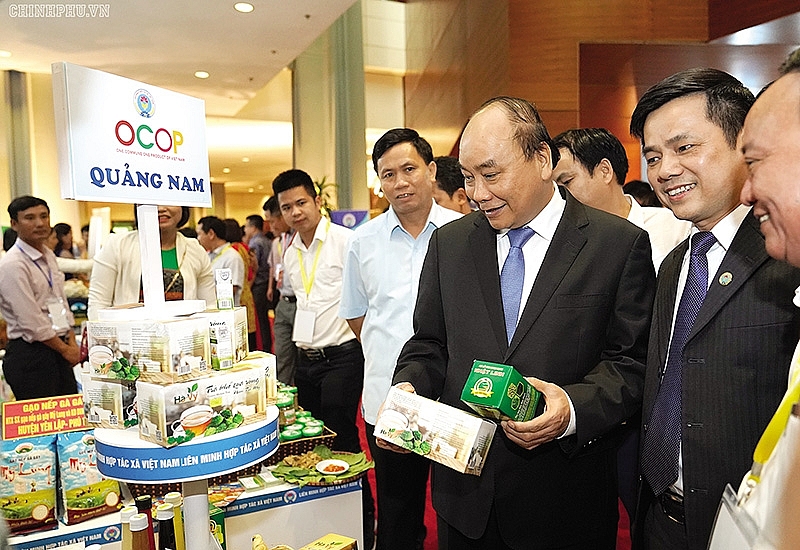Rolling boulders out the way of Vietnam’s collective economy
 |
| Prime Minister Nguyen Xuan Phuc visited a booth on the sideline of the conference last week |
At last week’s national conference on 15 years of implementation of Resolution 5 of the Party Central Committee on innovating, developing, and improving the efficiency of the collective economy, Minister of Planning and Investment Nguyen Chi Dung said that it has developed in both quantity and quality, gradually overcoming long-term weakness. “So far, the collective economy and the household account for over 30 per cent of GDP. Vietnam has nearly 23,000 co-operatives, more than half of which are in the agricultural sector,” he said.
According to him, in the last five years, the number of newly-established co-operatives increased rapidly. In 2018, there were 2,521 newly established units, up 2.6 times higher than in 2003. The number of employees working in this area amounts to 1.2 million and currently, there are 57 per cent of co-operatives operating effectively with average revenue of VND4.5 trillion ($195 million) per year. Besides that, average profit increased from VND74 million ($3,200) in 2003 to VND240.5 million ($10,000) in 2018.
“Over the last 15 years, the co-operative area is recovering and developing stably. The number increases steadily and spreads across regions with better quality. Particularly, many co-operatives have actively pursued production goals along the value-added chain, towards sustainable development,” the minister said. “So far, there are 1,200 co-operatives organising production associated with the value chain and applying high-tech.”
Working in the field of agriculture since 2004, Evergrowth Agricultural Co-operative in the southern province of Soc Trang has had 2,300 member households, with about 10,000 people. So far, after 15 years, Evergrowth has established two factories processing dairy and providing animal feeding.
“Before, we provided milk to some big companies. Due to the high value of products gained from processing, we built two factories and helped 2,300 households escape poverty,” Tran Hoang An, director of Evergrowth, told VIR.
Meanwhile, established in 1989 by the management board of Ho Chi Minh City Trading Cooperative, Saigon Co.op operates with the principle of collective ownership, self-control, and self-responsible production and business activities.
After 30 years, Saigon Co.op has secured its position in a drastically competitive market with an average growth of 25 per cent on-year.
Saigon Co.op holds about 40 per cent of the grocery retail market with benefit growth of 15 per cent on-year, contributes over VND200 billion ($8.6 million) per year, and provides jobs for over 16,000 people in the country.
However, according to Minister Dung, despite positive performance, many co-operatives are now facing numerous difficulties, as the internal capacity of some units is still weak, their facilities are poor, and management capacity is limited, so it is difficult to meet the requirements of the market economy.
An from Evergrowth said, “the government encourages co-operatives to develop but when we are big enough to establish enterprises, we need more capital which is not easy to borrow.”
According to An, the government understands and facilitates co-operatives in terms of capital and assigns the provincial policy banks to support. But working with banks, co-operatives still have to follow their strict regulations, and need to mortgage when borrowing capital.
“We are luckier than many other co-operatives to be granted land for operating. Many have to operate on the land of their members’ families. But we ourselves can’t mortgage that land to borrow capital,” An said.
“There should be clear rules in terms of time and renting prices. Moreover, co-operatives and their companies should be able to use that land,” he suggested.
What the stars mean:
★ Poor ★ ★ Promising ★★★ Good ★★★★ Very good ★★★★★ Exceptional
Latest News
More News
- MAE names big 10 policy wins in 2025 (February 06, 2026 | 08:00)
- US firms deepen energy engagement with Vietnam (February 05, 2026 | 17:23)
- Vietnam records solid FDI performance in January (February 05, 2026 | 17:11)
- Site clearance work launched for Dung Quat refinery upgrade (February 04, 2026 | 18:06)
- Masan High-Tech Materials reports profit: a view from Nui Phao mine (February 04, 2026 | 16:13)
- Hermes joins Long Thanh cargo terminal development (February 04, 2026 | 15:59)
- SCG enhances production and distribution in Vietnam (February 04, 2026 | 08:00)
- UNIVACCO strengthens Asia expansion with Vietnam facility (February 03, 2026 | 08:00)
- Cai Mep Ha Port project wins approval with $1.95bn investment (February 02, 2026 | 16:17)
- Repositioning Vietnam in Asia’s manufacturing race (February 02, 2026 | 16:00)

 Tag:
Tag:















 Mobile Version
Mobile Version